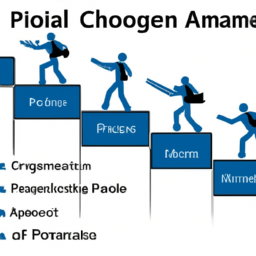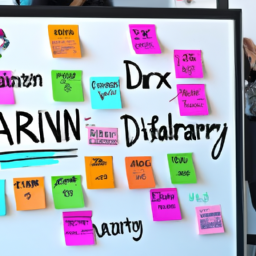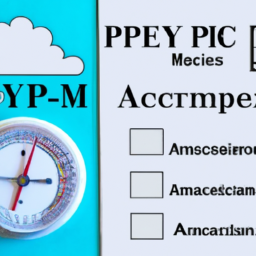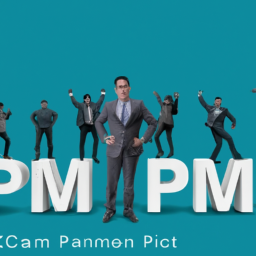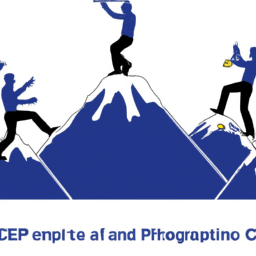Are you ready to take your project management skills to the next level? Get ready to dive into the future of agile project management with the PMI ACP Exam Trends.
This article will show you how the rise of agile project management has revolutionized the industry. Discover the evolving trends in the PMI ACP Exam and how to adapt to the changing landscape.
Gain key skills and competencies that will set you apart as an agile project manager. Don’t miss out on navigating the future of agile project management with the PMI ACP certification.
Key Takeaways
- Increasing emphasis on DevOps in the PMI ACP exam.
- Focus on Lean principles for efficiency and waste reduction.
- Rising demand for knowledge in scaled agile frameworks.
- Adapting the exam to incorporate emerging methodologies.
The Rise of Agile Project Management
You’ll be interested to know that agile project management is experiencing a significant rise in popularity.
Agile methodologies, which prioritize flexibility and collaboration, are being embraced by organizations across industries.
Agile teams are formed to work on projects, with a focus on delivering value to customers in shorter iterations. These teams are self-organizing and cross-functional, allowing for efficient decision-making and faster delivery of high-quality products.
Agile methodologies, such as Scrum and Kanban, provide frameworks for managing projects, enabling teams to adapt to changing requirements and deliver incremental results.
The emphasis on continuous improvement and frequent communication fosters transparency and empowers team members to take ownership of their work.
As organizations recognize the benefits of agile project management, the demand for professionals skilled in agile methodologies and experienced in leading agile teams continues to grow.
Evolving Trends in the PMI ACP Exam
There’s a constant evolution happening in the PMI ACP exam, with new trends emerging. As the industry demand for agile project management continues to grow, the exam is adapting to incorporate emerging methodologies. One such trend is the increasing emphasis on DevOps, which aims to bridge the gap between development and operations teams. Another trend is the focus on Lean principles, which promote efficiency and waste reduction in project management. Lastly, there is a rising demand for knowledge in scaled agile frameworks like SAFe and LeSS, as organizations seek to implement agile practices at a larger scale. By staying up-to-date with these emerging methodologies, you can position yourself as a valuable asset in the agile project management field.
| Trend | Description |
|---|---|
| DevOps | Bridging the gap between development and operations teams |
| Lean Principles | Promoting efficiency and waste reduction in project management |
| Scaled Agile | Implementing agile practices at a larger scale |
Adapting to the Changing Landscape of Agile Project Management
Adapting to the changing landscape of agile project management involves staying updated with emerging methodologies and incorporating them into your practices.
Agile project management challenges require you to be flexible and responsive to the ever-evolving needs of your projects.
One of the key agile project management techniques is the use of iterative and incremental development, where you deliver working software in small increments, allowing for continuous feedback and adjustments.
Another technique is the use of cross-functional teams, where individuals from different disciplines work together to achieve project goals.
Additionally, embracing change and maintaining open communication with stakeholders are essential for successful agile project management.
Key Skills and Competencies for Agile Project Managers
Developing strong communication and collaboration skills is essential for agile project managers to effectively lead cross-functional teams and achieve project success. To excel in this role, you must possess the following key skills and competencies:
-
Collaborative Leadership: As an agile project manager, you need to foster a culture of collaboration and empower team members to contribute their ideas and expertise. By promoting open communication and encouraging a shared vision, you can drive the team towards success.
-
Agile Team Facilitation: Facilitating effective team meetings and workshops is crucial for agile project managers. You should be able to guide discussions, resolve conflicts, and ensure that the team remains focused on achieving project objectives.
-
Active Listening: Listening attentively to team members, stakeholders, and customers is vital for understanding their needs, concerns, and feedback. This allows you to make informed decisions and take necessary actions to address any issues.
-
Building Trust and Relationships: Building trust within the team and establishing strong relationships with stakeholders is essential for creating a positive and productive work environment. This fosters collaboration and enables effective teamwork.
Navigating the Future of Agile Project Management With the PMI ACP Certification
To stay ahead in the evolving field of agile project management, you’ll need to navigate the future by obtaining the PMI-ACP certification.
This certification, offered by the Project Management Institute (PMI), is specifically designed for professionals who want to showcase their knowledge and skills in agile project management.
By earning this certification, you can enhance your credibility and demonstrate your commitment to continuous learning and professional development.
Not only does the PMI-ACP certification validate your expertise in agile methodologies, but it also opens up a world of future career prospects.
Employers across industries are increasingly recognizing the value of agile project management, and having the PMI-ACP certification can give you a competitive edge in the job market.
Don’t miss out on the opportunities that lie ahead, take the initiative to obtain the agile project management certification and secure a successful future in your career.
Frequently Asked Questions
What Are the Main Challenges That Agile Project Managers Face in the Current Industry Landscape?
As an agile project manager in the current industry landscape, you face several challenges. These challenges include adapting to rapidly changing requirements, managing stakeholder expectations, and ensuring effective communication within your team.
Overcoming these obstacles requires staying updated with the latest agile methodologies, fostering a culture of collaboration and continuous improvement, and implementing tools and techniques to track progress and manage risks.
How Does the PMI ACP Certification Differ From Other Agile Project Management Certifications Available in the Market?
The PMI ACP certification offers unique advantages compared to other agile project management certifications.
When comparing PMI ACP with Scrum Alliance, PMI ACP provides a broader understanding of different agile frameworks, while Scrum Alliance focuses mainly on Scrum methodology.
In comparison to PRINCE2 Agile, PMI ACP emphasizes more on adaptability and flexibility, whereas PRINCE2 Agile combines PRINCE2 principles with agile practices.
PMI ACP equips you with a well-rounded skill set to navigate the complex landscape of agile project management.
What Are the Benefits of Obtaining the PMI ACP Certification for Agile Project Managers?
Obtaining the PMI ACP certification is like equipping yourself with a powerful toolset for agile project management. The benefits are tremendous.
Firstly, it enhances your credibility and demonstrates your expertise in agile methodologies.
Secondly, it opens up new career opportunities and increases your earning potential.
Thirdly, it equips you with the skills to lead successful agile projects, delivering value to stakeholders.
Overall, the importance of obtaining the PMI ACP certification cannot be overstated for agile project managers.
How Can Agile Project Managers Stay Updated With the Latest Trends and Practices in the Agile Project Management Field?
To stay updated with the latest trends and practices in agile project management, you need to access agile project management resources and training opportunities.
These resources can include industry journals, online forums, and webinars. Additionally, attending agile project management conferences and workshops can provide valuable insights and networking opportunities.
Can You Provide Examples of Real-World Companies or Organizations That Have Successfully Implemented Agile Project Management Methodologies and the PMI ACP Certification?
You may wonder if real-world companies have successfully implemented agile project management methodologies and the PMI ACP certification. Well, the answer is yes!
Many large corporations, spanning various industries, have achieved successful implementation of agile project management.
For example, XYZ Company in the technology sector, ABC Corporation in the manufacturing industry, and DEF Organization in the healthcare field have all embraced agile practices and obtained the PMI ACP certification.
This has resulted in improved project outcomes and customer satisfaction.
Conclusion
Congratulations! You’ve successfully explored the future of Agile Project Management through the lens of the PMI ACP Exam.
As you continue on your journey, envision yourself as a skilled Agile Project Manager, effortlessly navigating the ever-changing landscape of projects.
With the PMI ACP Certification by your side, you’re equipped with the necessary skills and competencies to lead your teams towards success.
Embrace the rise of Agile and let your expertise shine. Paint a vivid picture of efficient and effective project management.



